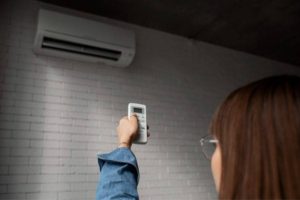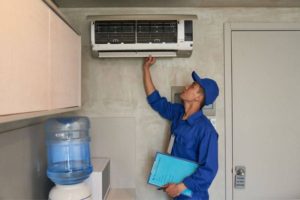Quick Navigation
Airbnb is a website popular for finding affordable and unique accommodations globally.

Guests must abide by rules and regulations when staying in rental properties. One crucial aspect of these rules is the use of air conditioning units.
This article will explain Airbnb’s air conditioning rules to help guests avoid any issues with their hosts during their stay.
Airbnb’s Policies on Air Conditioning
Airbnb has established policies regarding AC usage to prioritize the comfort of guests while promoting responsible and energy-efficient resource usage.
Hosts are required to establish their own rules and guidelines for air conditioning usage.
But Airbnb has provided some general recommendations and requirements that they are encouraged to follow.
Firstly, hosts are obligated to disclose in their listings whether or not their property has ACs.
If air conditioning is not available, hosts must be transparent and clearly state this in their listings. This is to prevent any confusion or disappointment for guests.
For properties with conditioning systems, hosts should provide detailed instructions on how to use the unit.
Usage guidelines such as setting a maximum temperature, indicating usage hours, or requesting that guests turn off the air conditioning when they are not in the room.
Hosts may also choose to charge additional fees for excessive use of the conditioning unit or for using the unit outside of designated hours.
These fees should be communicated to guests before booking.
Moreover, Airbnb encourages hosts to use energy-efficient conditioning units and set them to an appropriate temperature to conserve energy.
Hosts are also advised to frequently clean and maintain their AC units to ensure they are functioning optimally and efficiently.
Guests should review the air conditioning policies of their selected Airbnb listing before booking. This is to ensure they are aware of any guidelines or fees.
They should also respect the host’s guidelines and use conditioning units responsibly to avoid any potential issues.
Overall, Airbnb’s conditioning policies aim to balance guests’ comfort with responsible usage of resources and energy conservation.
Host’s Responsibilities for Air Conditioning
AC is a common feature in many homes and businesses. ACs provide a comfortable indoor environment by regulating temperature, humidity, and air quality.
While they can greatly improve indoor comfort, they also come with responsibilities for the host to ensure their safe and efficient operation, and the following are the host’s responsibilities for AC systems.
1. Regular Maintenance

One of the most important responsibilities of a host is to ensure that their air conditioning system is regularly maintained.
This includes cleaning or replacing filters, inspecting and cleaning coils, checking refrigerant levels, and ensuring proper drainage.
Neglecting maintenance can result in decreased efficiency, increased energy consumption, and potentially costly repairs.
2. Monitoring Indoor Air Quality
Another important responsibility of the host is to monitor indoor air quality. While AC systems can improve indoor air quality, they can also spread pollutants and contaminants if not properly maintained.
This can lead to health issues such as allergies, asthma, and respiratory infections.
To prevent this, hosts should regularly monitor indoor air quality using air quality monitors and take action if the levels of pollutants exceed acceptable levels.
3. Proper Installation
Proper installation of an AC system is also crucial for its safe and efficient operation.
Hosts should ensure that the system is installed by a qualified professional, following all local building codes and regulations.
This includes ensuring that the system is properly sized for the space intended to cool. The ductwork should be installed correctly, and the system adequately ventilated.
4. Energy Efficiency
Air conditioning systems can be a significant source of energy consumption, which can increase utility costs and contribute to climate change.
Hosts should take steps to improve energy efficiency, such as upgrading to a more efficient system or installing programmable thermostats.
Additionally, hosts can reduce energy consumption by using natural ventilation and shading techniques to reduce the need for air conditioning.
5. Safety Measures
Finally, hosts should take safety measures to ensure the safe operation of their AC systems.
This includes ensuring that the system is grounded correctly, that all electrical connections are secure, and that flammable materials are kept away from the system.
Hosts should also ensure that all safety features, such as shut-off switches, are in proper working order.
Guest Expectations for Air Conditioning
One of the key amenities that guests expect when booking an Airbnb is an AC, and in this section, we will discuss the guest expectations for air conditioning in Airbnb.
1. Availability
The first and foremost expectation of guests is the availability of AC systems. Guests typically expect AC to be available in their Airbnb, especially if they are traveling to a hot or humid location.
Conditioning units can be a deciding factor for guests when choosing an Airbnb, and a lack of them can lead to negative reviews.
2. Temperature Control
Guests also expect to have control over the temperature of the Airbnb unit.
This includes the ability to adjust the temperature according to their preferences and to have the temperature remain consistent throughout their stay.
Guests expect the AC unit to be powerful enough to cool the entire unit, including bedrooms and common areas.
3. Cleanliness

Guests expect the AC unit to be clean and free of dust, dirt, and debris. A dirty unit can cause health issues and reduce the effectiveness of the system.
Hosts are expected to maintain the AC unit and change filters regularly to ensure that the system is clean and functioning properly.
4. Noise Level
Guests also expect the AC unit to be quiet and not disrupt their sleep or other activities. Loud or noisy units can be a source of frustration and lead to negative reviews.
Hosts should ensure that the conditioning units are in good working condition and properly maintained to reduce noise levels.
5. Energy Efficiency
Finally, guests expect the conditioning units to be energy-efficient and not contribute to unnecessary energy consumption.
This can include using programmable thermostats, providing instructions on how to use the system efficiently, and ensuring that the unit is properly sized for the space it is intended to cool.
Guests have certain expectations for AC in Airbnb units. Availability, temperature control, cleanliness, noise level, and energy efficiency are all important factors that guests consider when booking an Airbnb.
Hosts should ensure that their conditioning units meet these expectations to provide a comfortable and enjoyable experience for their guests.
Conclusion
In conclusion, Airbnb air conditioning rules are essential for both hosts and guests to ensure a comfortable and enjoyable stay.
Hosts are responsible for providing air conditioning in their units. Guests have certain expectations for AC availability, temperature control, cleanliness, noise level, and energy efficiency.
Hosts should also follow best practices such as regular maintenance, clear communication with guests, and promoting energy efficiency to provide a positive guest experience.
By following these rules and best practices, hosts can create a welcoming and comfortable environment for their guests and receive positive reviews and repeat bookings.






